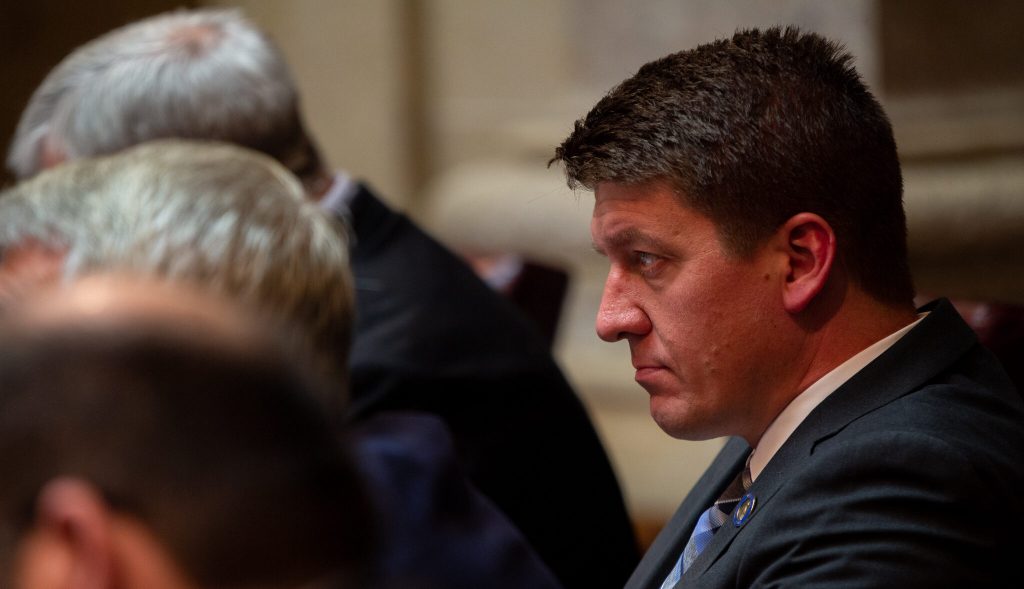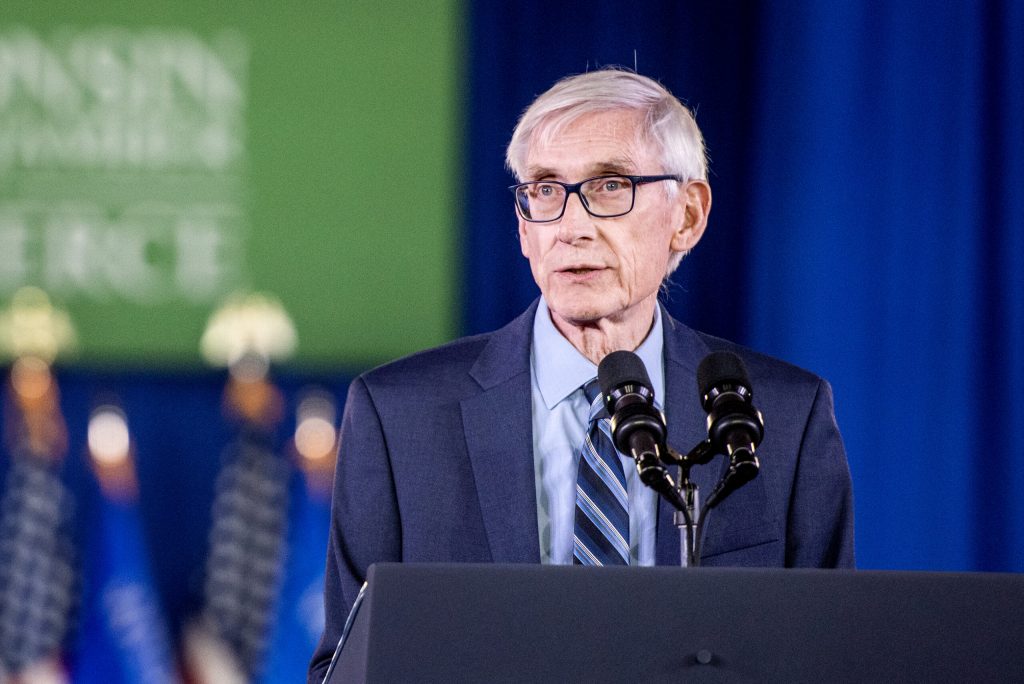Lawmakers, Evers At Odds Over Control of $171 Million in Interest
Whether the interest is considered federal or state money is 'open and novel legal question' according to a nonpartisan state attorney.

Wisconsin state Sen. Eric Wimberger, R-Green Bay, is photographed during a state Senate session on June 28, 2023, in the Wisconsin State Capitol building in Madison, Wis. Drake White-Bergey/Wisconsin Watch
More than five years after the COVID-19 pandemic began, Republican lawmakers and Gov. Tony Evers are still at odds over who controls federal money that flowed to the state to address the public health emergency.
Their latest dispute involves more than $171 million in interest that’s been generated from federal funds aimed at helping Wisconsin recover from the pandemic. Whether the interest revenue counts as state or federal money is an open question.
The dispute follows an audit of the state’s 2022-23 financial statements in which the nonpartisan Legislative Audit Bureau stated the interest on federal funds wasn’t subject to any restrictions by the U.S. Treasury Department. The audit report, nonetheless, recommended Evers’ Department of Administration report it as state general purpose revenue.
Last year, DOA Secretary Kathy Blumenfeld told state Sen. Eric Wimberger, R-Oconto, and state Rep. Robert Wittke, R-Caledonia, who co-chair the Legislature’s audit committee, that guidance from the U.S. Treasury Department indicated the interest funds may be used to defray administrative costs associated with disbursing federal COVID aid. On May 9, Blumenfeld said that interest had grown to $171,487,101.82.
Unhappy with the response, Wimberger and other Republicans introduced a bill on May 28 to force the transfer of that interest revenue to the state’s general fund.
During a public hearing Thursday before the Senate Committee on Government Operations, Labor and Economic Development, Wimberger accused Evers of creating a “slush fund” with the money and said state law is clear about where it must go.
“If the federal government can give money to a governor and the governor not spend it and just collect interest, then there’s nothing stopping the federal government from piling in tens of billions of dollars into an account for the governor to then accrue interest and run his own shadow government on it,” Wimberger said. “It cuts out the whole idea of the Legislature controlling the purse.”

Gov. Tony Evers gives a speech before Pres. Joe Biden’s appearance Wednesday, Dec. 20, 2023, at the Wisconsin Black Chamber of Commerce in Milwaukee, Wis. Angela Major/WPR
When asked by Democrats about the DOA’s position, Wisconsin Legislative Council Attorney Emily Hicks said the department’s argument is: because the federal government waived a requirement that interest from COVID funds be returned, that $171 million is considered federal funds.
“It is an open and novel legal question, and so I can’t definitively say one way or the other,” Hicks said.
“But clearly, this is sort of an extension of debates this Legislature and this governor have had for essentially five years running now over who should have authority over federal COVID relief money,” Spreitzer said. Spreitzer asked why Republican lawmakers haven’t sued Evers or the department in order to have the courts settle the matter when the Legislature “has not been shy about suing the governor when they disagree with something.”
Wimberger responded, saying the bill is a way to avoid a “few hundred thousand dollars in litigation,” but said there are other steps lawmakers can take.
“We can make these allegations in an impeachment, but we’re not going to talk about that,” Wimberger said. “That’s ramping it up beyond what it needs to be. So we’re just going to try and pass the bill and see if we can talk some sense into the governor.”
Throughout the hearing, Wimberger, Spreitzer and Wittke referenced a proposed constitutional amendment, which was rejected by voters last year. It was aimed at restricting Evers’ power to spend federal funds without legislative approval.
Spreitzer claimed the referendum’s defeat was Wisconsin residents’ way of saying, “We trust the governor more than the Legislature on this.” Wittke responded by stating he’d “like it on the record” that the referendum failed because “a group on the other side of the aisle spent $4 million to misrepresent what the amendment did.”
“In this case, the federal government waived the requirement to remit interest earned,” the statement said. “However, these are still technically federal funds and are being treated as such (i.e. legally received by the state and recorded as federal revenue).”
Republicans at odds with Evers administration over who controls $171M in interest from federal COVID aid was originally published by Wisconsin Public Radio.
If you think stories like this are important, become a member of Urban Milwaukee and help support real, independent journalism. Plus you get some cool added benefits.





















Let the Governor use the money to help the people of Wisconsin.
Do we have to waste valuable time on this issue? Is there any question that the money must be spent on doing good for the people of Wisconsin?
Do we believe the Governor will use the money for something other than helping the people of Wisconsin?
Let the Legislature recommend where this interest money is allocated, and then report on what the Governor does with the funds. The Governor is also an elected official.